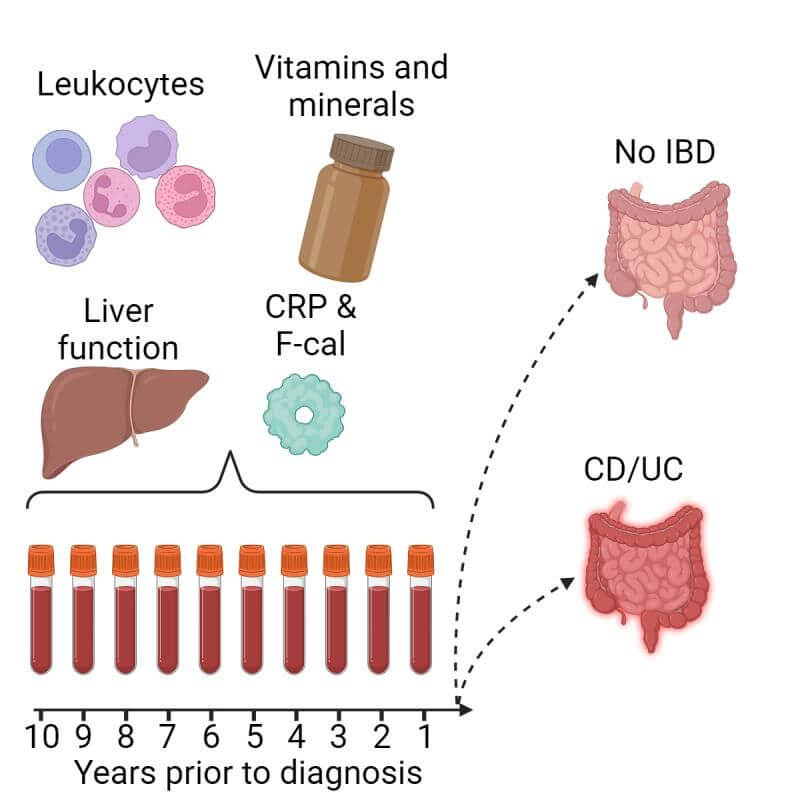LONDON — Inflammatory bowel disease (IBD) can refer to either Crohn’s disease or ulcerative colitis, as both conditions can cause chronic inflammation of the gastrointestinal (GI) tract and symptoms like constant diarrhea, stomach pain, and weight loss. While these conditions are pretty hard to miss once symptoms set in, groundbreaking new research now suggests blood tests may be able to detect signs of impending IBD up to eight years before a diagnosis of Crohn’s disease and up to three years before ulcerative colitis.
These findings indicate the early beginnings of inflammatory bowel diseases start long before symptoms appear. Study authors from the Francis Crick Institute and Aalborg University in Copenhagen believe their work may one day provide an opportunity for doctors to take preventative action on IBD before symptoms begin, and prescribe medication at the most effective moment.
Today, both Crohn’s disease and ulcerative colitis are considered incurable. Doctors stress the importance of early detection when it comes to improving long-term health outcomes, but that doesn’t always happen. For example, close to a quarter of the 25,000 IBD patients treated each year in the United Kingdom wait over a year for their initial diagnosis. Estimates show that about one percent of the U.S. adult population lives with a form of IBD.
To reach these new findings, the study authors used the electronic health records of individuals living in Denmark to compare 20,000 people with an IBD diagnosis with 4.6 million healthy people without IBD.
The majority of doctors and scientists nowadays believe most patients begin experiencing IBD symptoms roughly a year before their diagnosis, but significant bowel damage can often take place by then, suggesting internal shifts begin far earlier.
Study authors were able to confirm this hypothesis by analyzing a decade’s worth of test results before diagnosis. More specifically, they assessed changes in a series of minerals, cells in the blood, and markers of inflammation. This included fecal calprotectin, a molecule released into the gut during inflammation that is currently used as a marker to determine which people with bowel symptoms warrant further investigations. The team observed changes up to eight years before the diagnosis of Crohn’s disease and up to three years prior to an ulcerative colitis diagnosis.

The researchers looked at a number of clinical tests up to ten years before an inflammatory bowel disease diagnosis, comparing these to healthy controls.
( Vestergaard, M. Cell Reports Medicine.)
Crucially, most of the observed early changes were quite subtle and would have appeared within the normal range for standard blood tests, thus eluding medical detection. Researchers needed a massive dataset to see these subtle shifts across many different markers.
Moving forward, researchers say their next steps are to investigate if treatment or prevention has an impact before symptoms appear and determine if these findings can be further developed to predict who will develop IBD in the future.
“So many young people are affected by IBD. Their lives, hopes and aspirations for the future are turned upside down by a diagnosis and trying to live with a chronic disease. As a young person myself, it gets me. I am happy that our research might help predicting who could potentially suffer from IBD and thus start treatment earlier which would greatly improve their quality of life,” says first study author Marie Vestergaard, a PhD student at the Center for Molecular Prediction of Inflammatory Bowel Disease, PREDICT, at Aalborg University, in a media release.
“Our research shows that the bowel damage we’re seeing at the point of diagnosis is just the tip of the iceberg. So many changes are subtly taking place in the body before the disease takes hold,” explains James Lee, Group Leader of the Genetic Mechanisms of Disease Laboratory at the Crick.
“This has huge implications for prevention as it highlights that there’s a window of opportunity for treatment. We don’t yet know whether preventative measures like changing diet or stopping smoking would stop someone getting these diseases, but this opens the door to that possibility. It also underscores the importance of early diagnosis and treatment, as many of the changes in the gut are likely to have been happening long before people become ill.”
“Our findings are novel and go hand-in-hand with emerging evidence that chronic inflammatory bowel diseases likely have their onset years prior to diagnosis. These incurable diseases affect young individuals and are twice as common as type 1 diabetes. Understanding the exact mechanisms behind their development is essential to ultimately prevent the diseases from occurring. Our unique Danish data resources combined with cross-disciplinary and international collaboration help answering yet unanswered questions critical for patients worldwide,” adds Tine Jess, Director at the Center for Molecular Prediction of Inflammatory Bowel Disease, PREDICT, at Aalborg University.
“There are over 500,000 people in the UK with Crohn’s and Colitis. We know that earlier diagnosis leads to better outcomes for everyone, but waiting lists for diagnostic tests can be long. Not only that, many people put off going to the GP to get their symptoms checked out – either because they don’t realize how serious they could be, or through fear or embarrassment. Anything that could potentially speed up the process of getting an accurate diagnosis is a hugely positive step in the right direction,” concludes Sarah Sleet, CEO of Crohn’s & Colitis UK.
The study is published in the journal Cell Reports Medicine.



Recommended Comments
There are no comments to display.
Join the conversation
You can post now and register later. If you have an account, sign in now to post with your account.
Note: Your post will require moderator approval before it will be visible.